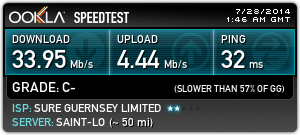Another late night Speedtest. Upload speeds are very consistent, approaching the advertised 5 Mbps. However download speeds still appear to be lower than the full 40 Mbps, the maximum actual throughput is more like 34 Mbps on a fully synced line.
Interestingly, and this could be a bug, Speedtest.net says this connection is “Slower than 57% of GG”. How this is possible, I don’t know? I can only assume that the reason is leased line customers with much faster connections doing a lot of testing recently.
On another note, this September we are approaching the 2nd anniversary of Sure’s VDSL service launch. Fingers crossed for some sort of upgrade announcement! After all, when LTE launches next year, it wouldn’t ‘seem’ right for their VDSL to offer the same speeds as the 4G mobile network.


I would try testing to Eastbourne or Bouygues Telecom in Paris. Eastbourne in particular tends to give the most accurate results.
I tested to Eastbourne and the results were very similar (34.2 mbps). I don’t think the choice of server makes a massive difference, so long as you choose the larger ones ( I have had problems with Vodafone’s newbury server before, for example)
My VDSL speeds have been dramatically affected recently after more customers have subscribed in close proximity. It has become a victim of its own success.
The increased quantity of subscribers has caused crosstalk in the multi core feeds to the nearest telephone pole, at one point reducing my speed from a previously consistent 40Mb/s to less than 13. Even after engineers investigated and have presumably found a different copper pair to feed my service from the nearest cabinet, the down speed still maxes out at 33Mb/s.
Their T&C of course focuses on the “up to” aspect of the advertised speed, but they do not tell you that you must also be prepared to accept a 20% or more reduction in your original speed if they sell the service to more of your neighbours too.
If the regulator had any real clout, they would prevent existing customers from suffering, simply because the service provider wishes to over utilise the existing infrastructure which leads to service impacting crosstalk.
Sounds like classic crosstalk problems with VDSL – Same issue occurring in UK.
Only real solution is to use Vectoring, a technology still in it’s infancy and not really used commercially yet.